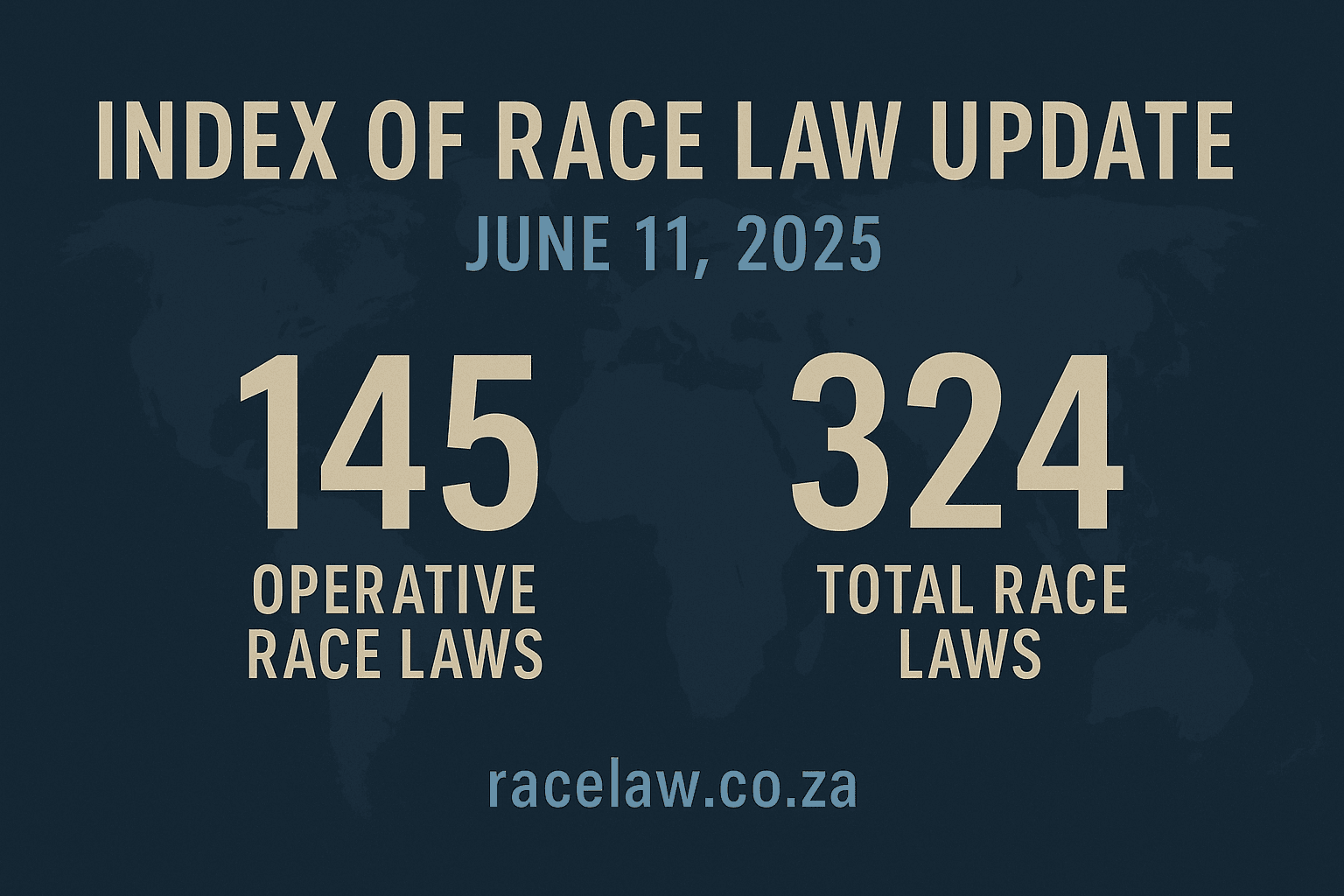The Creeping Tide: South Africa's Race Law Index Updated – More Laws, More Concerns

Refuge For Afrikaners
6/11/2025

For those closely monitoring the legislative landscape in South Africa, particularly as it pertains to race-based laws, the latest update to the "Index of Race Law" (racelaw.co.za) on June 11, 2025, provides sobering reading and reinforces many of the concerns held within the Afrikaner community.
This meticulously maintained index serves as a critical, if deeply troubling, resource, cataloging the proliferation of legislation that explicitly uses race as a determining factor in its application. The latest update reveals a continued trend towards an increasingly racialized legal framework.
Key Changes in the June 2025 Race Law Index Update:
According to the update, the following significant changes have been recorded:
Increase in Operative Race Laws: Five new race laws have been added to the index. Three of these are already operative (in effect), bringing the total number of operative race laws from 142 to 145.
Increase in Total Race Laws: The total number of identified race laws (including those adopted but not yet commenced) has risen from 319 to 324.
Methodological Change – "Uncommenced" Laws Now Indexed: A notable change is that Acts of Parliament that are racial in nature, have been adopted and signed by the President but are not yet in operation ("uncommenced"), will now appear directly in the main Index. They will be tagged as "Uncommenced" or "Amdt Uncommenced" (for racial amendments to previously non-racial Acts). This provides a more immediate view of the legislative pipeline.
Clarification on "Originally Racial" Acts: The methodology now clarifies that Acts simply tagged "Racial" are, to the best of the Index's knowledge, originally racial in their intent, rather than being racialized later through amendments.
Retrospective Racialisation: The homepage now clarifies that the stated number of Acts adopted "during" the democratic era (122) is a minimum, as some pre-1994 Acts have been retrospectively racialised by post-1994 laws – a concerning development in itself.
Newly Identified or Updated Racial Provisions – A Closer Look:
The update details specific Acts that have either been newly identified as racial, had their racial provisions commenced, or are awaiting commencement:
Rental Housing Act (50 of 1999): Previously considered an "Upcoming Race Law," further investigation found an operative racial provision requiring government to focus on promoting affordable rental housing among "historically disadvantaged persons." The uncommenced Rental Housing Amendment Act (35 of 2014) will further racialise this by mandating racial and other demographic representation in Rental Housing Tribunals.
National Environmental Management Act (107 of 1998): Racialised by the National Environmental Management Laws Amendment Act (2 of 2022), this provision commenced on June 30, 2023. It requires organs of state to promote the participation of "black professionals" in the environmental management sector.
Extension of Security of Tenure Act (62 of 1997): Racialised by the Extension of Security of Tenure Amendment Act (2 of 2018), this provision commenced on April 1, 2024. It establishes a Land Rights Management Board whose nominations committee must be "broadly representative of the racial groups, communities, and interests affected."
Upstream Petroleum Resources Development Act (23 of 2024) (New & Uncommenced): This newly added Act contains multiple racial provisions aimed at the inclusion of "black persons" in the sector. It is not yet in operation.
Civil Aviation Act (13 of 2009) (Amendment Uncommenced): This Act has been amended and racialised by the Civil Aviation Amendment Act (22 of 2021). This amendment, yet to commence, empowers the Minister to establish a structure to pursue the "transformation" (often a code for racial targets) of the industry.
What This Means for Afrikaners and Minorities
Each update to this Index paints a clearer picture of a legislative environment where race is not diminishing as a factor, but is becoming increasingly entrenched across various sectors of South African life – from housing and environmental management to resource development and aviation.
For the Afrikaner community and other minorities, these laws often translate to:
Reduced Opportunities: Preference given based on racial classification can limit access to jobs, tenders, and economic participation.
Increased Scrutiny and Pressure: Mandates for "transformation" and "broad representation" often place immense pressure on businesses and institutions, sometimes irrespective of merit or availability of skills.
Erosion of Non-Racial Ideals: The sheer volume of race-based legislation stands in stark contrast to the ideal of a non-racial society that many hoped for post-1994.
A Sense of Alienation: For communities who do not fall into the "historically disadvantaged" or "black" categories as defined by these laws, it can foster a sense of being systematically excluded or even targeted.
The "Index of Race Law" is not just a collection of statutes; it's a testament to a policy direction that has profound implications for the future of all South Africans, and particularly for minorities who see their rights and opportunities increasingly defined and limited by their racial classification.
We urge our readers to familiarize themselves with this resource (https://racelaw.co.za/index-of-race-law/) to understand the full extent of this legislative framework. The trend is clear, and the concerns are growing. This isn't about denying historical imbalances, but about questioning whether the entrenchment of new racial laws is the path to a truly equitable and united future, or one that perpetuates division and new forms of discrimination.
What are your thoughts on this continued expansion of race-based legislation?
Stay Updated on news about President Trump's Executive Order on Addressing Egregious Actions of the Republic of South Africa
Subscribe to our newsletter for the latest resources and community updates.